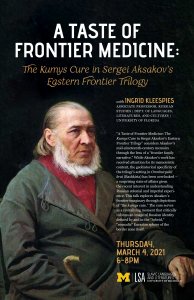Presented By: Slavic Languages & Literatures
A Taste of Frontier Medicine: The Kumys Cure in Sergei Aksakov’s Eastern Frontier Trilogy
Ingrid Kleespies — Associate Professor of Russian Studies at the University of Florida

"A Taste of Frontier Medicine” considers Sergei Aksakov’s extensive, mid-nineteenth-century memoirs through the lens of a “frontier family narrative,” a genre perhaps more familiar in the American literary setting. While Aksakov’s work has received critical attention for its memoiristic content and attention to nature, the geohistorical specificity of the trilogy’s setting has been overlooked. This is surprising given the recent interest in understanding Russian colonial and imperial experience. A Family Chronicle (1856) and Childhood Years (1856) are not books in which the action could take place anywhere or in some generic pastoral or provincial space. Rather, they are about a specific place – Orenburgskii krai (Bashkiria) – that was a borderland, frontier, and contact zone from the time of its inclusion within Russian imperial space in the sixteenth and seventeenth centuries into Aksakov’s lifetime. In “A Taste of Frontier Medicine,” I explore some of the ways in which the eastern Russian border with “Asia” broadly understood frames Aksakov’s work, as well as how these texts make claims about Russian identity as something defined by and in the “hybrid,” Eurasian sphere of the border zone. Discussion will center on two episodes that articulate a critical aspect of Aksakov’s frontier imaginary: the narrator’s mother’s taking of a “kumys cure.” The “kumys cure” serves as a revitalizing moment that establishes “nomadic,” “Asiatic” elements of the frontier as a crucial antidote to both a perceived excess of civilization and, counter-intuitively, to the potential dangers of the frontier zone itself.